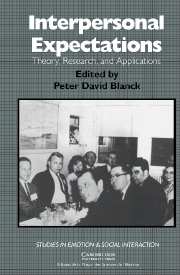Book contents
- Frontmatter
- Contents
- Preface
- List of contributors
- Introduction
- Part I Research on interpersonal expectations
- Part II Research on the mediation of interpersonal expectations through nonverbal behavior
- Part III The study of interpersonal expectations
- 17 The methodological imagination: Insoluble problems or investigable questions?
- 18 Issues in studying the mediation of expectancy effects: A taxonomy of expectancy situations
- 19 Analysis of variance in the study of interpersonal expectations: Theory testing, interaction effects, and effect sizes
- 20 Statistical tools for meta-analysis: From straightforward to esoteric
- 21 The volunteer problem revisited
- 22 Assessment and prevention of expectancy effects in community mental health studies
- 23 Comment: Never-ending nets of moderators and mediators
- Author index
- Subject index
- Studies in Emotion and Social Interaction
17 - The methodological imagination: Insoluble problems or investigable questions?
from Part III - The study of interpersonal expectations
Published online by Cambridge University Press: 23 December 2009
- Frontmatter
- Contents
- Preface
- List of contributors
- Introduction
- Part I Research on interpersonal expectations
- Part II Research on the mediation of interpersonal expectations through nonverbal behavior
- Part III The study of interpersonal expectations
- 17 The methodological imagination: Insoluble problems or investigable questions?
- 18 Issues in studying the mediation of expectancy effects: A taxonomy of expectancy situations
- 19 Analysis of variance in the study of interpersonal expectations: Theory testing, interaction effects, and effect sizes
- 20 Statistical tools for meta-analysis: From straightforward to esoteric
- 21 The volunteer problem revisited
- 22 Assessment and prevention of expectancy effects in community mental health studies
- 23 Comment: Never-ending nets of moderators and mediators
- Author index
- Subject index
- Studies in Emotion and Social Interaction
Summary
Introduction
The relationship between social scientists and the research methods they use is often curious. Although much is published about the substance of research, methodological dilemmas, debates, and dead ends are rarely reported. Because of an emphasis on results and findings, scholarly books and journal articles rarely provide more than a list of the techniques used to generate the final version of a study. One seldom encounters reflective commentary about how researchers weighed alternative methods or conquered unanticipated obstacles. Finally, except by chance, one almost never reads of projects abandoned or analyses not attempted because of methodological constraints or prohibitions.
There appears to be increasing interest in such questions. There are a few works that provide provocative “backstage” accounts of the methodological conflicts, dilemmas, and debates scholars encounter (e.g., Berger, 1990; Glazer, 1972; and Golden, 1976). There are also autobiographical works that become central to raging controversies about research methods, sometimes decades after the original scholarship appeared (e.g., Freeman, 1983; Malinowski, 1989; and Mead, 1972, 1977). There are even fascinating inquiries into whether or not scholarship is being as well protected as many have believed by revered practices such as peer review (Broad, 1980), replication (Mulkay & Gilbert, 1986), and, of course, fraud detection (Broad & Wade, 1982; Colt, 1983; Fletcher, 1991; Kohn, 1987).
A different and somewhat more subtle question involves how researchers are affected by recognized or emerging methodological problems. For example, when confronted with an apparently devastating design problem, does a researcher dejectedly abandon a method or line of inquiry, or is a more creative response identified?
- Type
- Chapter
- Information
- Interpersonal ExpectationsTheory, Research and Applications, pp. 337 - 349Publisher: Cambridge University PressPrint publication year: 1993
- 3
- Cited by



